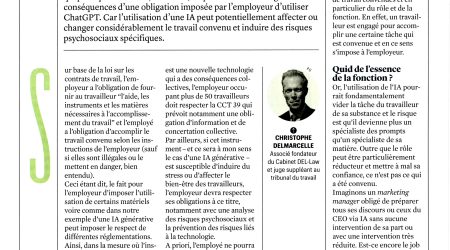Picket lines on public roads: not everything is allowed
Posted the 2 April 2025An angry driver forced a picket line yesterday, injuring two strikers in the process. This provides an opportunity to revisit the legality of pickets organized on public roads.
Since there is no legal definition, a strike is generally considered as a work stoppage.
Strictly speaking, organizing picket lines, as well as blocking or occupying a company, is not part of the right to strike. However, international case law increasingly accepts picket lines as an extension of the right to strike, giving it effectiveness as an action to encourage strikers or discourage non-strikers.
But these so-called “separable acts” of the strike, as they are referred to, may be prohibited if they constitute an unlawful act particularly when they involve violence, damage to property, criminal behavior, or excessive infringement on the employer’s property rights or the rights of third parties and non-strikers.
Is it a “malicious obstruction of traffic”?
In the case of this accident, the picket was clearly set up on a public road, thereby obstructing road users’ access. This although it does not excuse the driver led to a collision, raising the question of the legality of this picket under Article 406, §1 of the Belgian Criminal Code, which criminalizes “malicious obstruction of traffic.”
This requires interpretation of the term “malicious,” added in 1963 to this century-old law: does it mean that merely intending to block the road is enough, or does it require that the roadblock pursue a specifically “malicious” purpose? If the latter, it would be much harder to convict a striker.
Both interpretations have been seen in Belgian case law for example, before the Labour Court of Antwerp in 2019, where a picket had been set up at a road intersection near the Port of Antwerp. The Court held that the mere blocking of the road constituted a malicious obstruction.
However, the Cheratte incident on 19 October 2015 where the A30/E40 motorway was blocked near the Cheratte bridge for several hours, causing several incidents (including a doctor being unable to reach an emergency) allowed for further clarification. Several strikers, including union delegates, were convicted both in the first instance and on appeal for malicious obstruction of traffic.
The European Court of Human Rights sided with Belgium
In a ruling dated 23 March 2022, the Belgian Court of Cassation reaffirmed its case law from 7 January 2020, deciding that picket lines blocking public roads are criminally prohibited on grounds of road safety. Participating in a union action does not grant immunity to those responsible for such blockages.
More recently, on 16 January 2025 (Bodson & others), the European Court of Human Rights explicitly ruled in favor of Belgium, confirming that the right to strike as guaranteed by Article 11 of the European Convention on Human Rights does not include the right for a union or its members to block public roads without prior authorization. Such blockages, when they completely paralyze a major highway for several hours, significantly disrupt daily life and the lawful activities of uninvolved individuals and create a dangerous situation for road users.
The Court also emphasized that a striker involved in such unlawful acts could face dismissal for serious misconduct.
That said, the specific circumstances must be considered. It is not certain that the incident on Monday constitutes such a “malicious obstruction,” especially given the limited size of the road in question (a small road) and the fact that the blockade did not appear to be absolute some vehicles were reportedly allowed through, suggesting it functioned more like a filter checkpoint.
In any case, nothing justified the use of violence against the strikers.
Related articles

Is an employer allowed to mandate the use of artificial intelligence tools by employees ? (Trends, 17-07-2025)

Caution if a former colleague opposed to your employer asks you to testify in their favor
